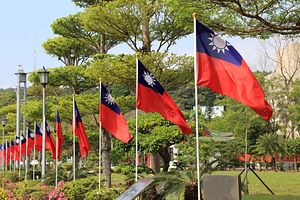Taiwanese of all stripes were aghast this week after eight Taiwanese nationals were among a group of Chinese citizens forced onto a plane to China last Friday. It is not known why Chinese authorities sought to have the Taiwanese extradited to China; the eight had been cleared of charges of telecommunications fraud by a court in in Kenya. The incident, which Taipei has described as “illegal abduction” and “uncivilized action,” raises serious questions about Chinese extraterritoriality and the “one China” policy.
The eight nationals in question were among a total of 37 individuals — 23 of them Taiwanese — who were acquitted of fraud in an April 5 Kenya High Court decision and were given 21 days to leave Kenya. One of the eight is reportedly a Taiwanese-American. The remaining 15 Taiwanese were put on a plane to China on Tuesday, also in defiance of the court order. Chinese officials in Kenya reportedly pressured Kenyan authorities to send the Taiwanese nationals to China.
Taiwanese foreign ministry officials dispatched from South Africa (Taiwan has no official diplomatic relations with and no representative office in Kenya) have been denied access to the Taiwanese individuals, and reports indicate that submachine gun-wielding Kenyan police used tear gas to subdue the Taiwanese who resisted deportation. Kenyan authorities had also told the Taiwanese that their government had bought them tickets to return home, which turned out to be a lie (see an undated letter by detainees expressing fears of being sent to China).
Kenya’s Interior Ministry maintains that the Taiwanese nationals entered Kenya illegally and were to be extradited to China because this was the route they had taken to enter the country. Taipei has called the act “a gross violation of basic human rights.” Taiwan’s Foreign Ministry has reached out to Kenyan parliamentarians and rights activists to provide assistance in filing a lawsuit against Kenyan police.
According to an official from the Africa division at Taiwan’s Ministry of Foreign Affairs, a total of 45 Taiwanese nationals based in Kenya have been extradited to China in two unrelated cases.
At this point, it is difficult not to regard the move as a case of abduction of foreign nationals by China with Kenyan complicity. While Beijing and Nairobi began talks on an extradition treaty in August 2015, an extradition treaty normally facilitates the return of a national to his or her country of origin to face prosecution. The problem, of course, is that Taiwanese are holders of a Republic of China (ROC) passport, not one from the People’s Republic of China (PRC).
Beijing could have wiggled out of this one by pointing to the precedent set by the U.S. in its efforts to combat international cyber crime, under the premise that the activities of the alleged criminals were detrimental to China’s security. One case, for example, involved the deportation in 2007 of 23-year-old Ovidiu-Ionut Nicola-Roman, a Romanian citizen, to the United States under a Mutual Legal Assistance Protocol and extradition treaty between the United States and Romania. Several other Romanian nationals involved in the scheme were expected to be sent to the United States to face prosecution. Ukrainian and Estonian nationals have also been extradited to the United States under similar agreements. “Criminals who exploit the power and convenience of the Internet do not recognize national borders; therefore our efforts to prevent their attacks cannot end at our borders either,” Deputy Attorney General Mark R. Filip said at the time.
In 2009, Taiwan and China signed a joint crime-fighting agreement, which arguably could have facilitated the exchange of information between the two sides had the Taiwanese individuals been sent back to Taiwan.
But China’s Ministry of Foreign Affairs didn’t refer to the U.S. precedent or cross-strait agreements, and instead lauded Kenya’s decision, implying that the extradition was the result of Nairobi’s adherence to the “one China” policy. In other words, Beijing would rather be accused of abduction and extraterritoriality — and would rather risk alienating the Taiwanese — than to refer to a practical and arguably sensible precedent, set by the United States, that would imply that Taiwanese are not Chinese citizens subject to PRC laws.
Due to the complicity of various regimes that have developed close ties with Beijing over the years, this latest incident also suggests that Taiwanese “criminals” — a category that, under the PRC’s National Security Law, which supposedly extends to Hong Kong, Macau, and Taiwan, could include “splittism” and other loosely defined threats to national security — no longer have assurances of due process when they travel abroad.
According to Reuters, on April 8 — the same day the Taiwanese were loaded on the plane to China — Kenya announced it would receive a new loan of $600 million from China to help Nairobi address its budget deficit.
In February 2011, the Philippines deported 14 Taiwanese involved in an investment scam to China alongside 10 Chinese nationals, sparking anger in Taipei. Manila refused to apologize for the incident. A later crackdown in October 2015 resulted in the deportation of 42 Taiwanese nationals back to Taiwan at a time of high tensions between the Philippines and China over parts of the South China Sea.

































